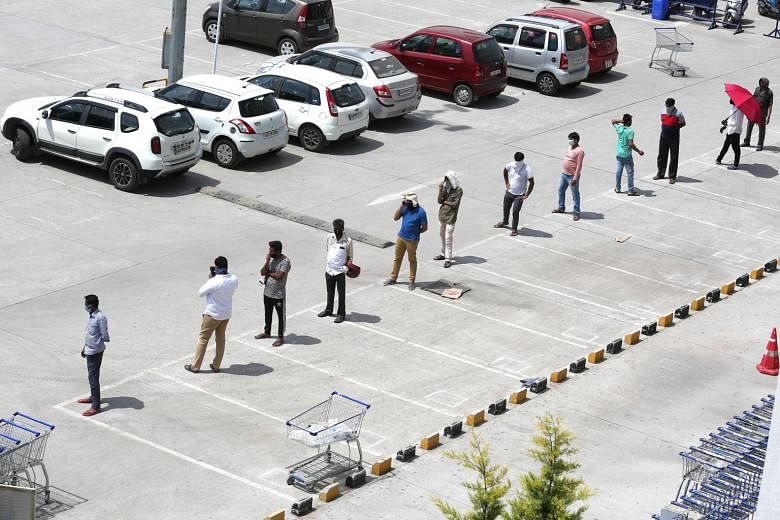BANGALORE - Few things can teach you obedience like going out to buy vegetables during a "coronavirus lockdown", as we Indians are calling it now. Hoarding, long lines, and empty shelves seem like first-world problems to us.
Most Indians today are afraid of cops stopping, chasing, beating, yelling, or punishing us for venturing out. We didn't know this until last Wednesday (March 25), the first day of a nationwide lockdown in India.
In Bangalore, I avoided the initial panic-stricken rush to supermarkets, and walked out at 7am on the third day, wearing the mask I had purchased for triple its usual price a week ago.
A dozen people in my neighbourhood, most with masks or at least scarves and handkerchiefs across their faces, purchased milk, vegetables and fruit from vendors on the footpath.
It had just hit me that the prices had quadrupled, when a middle-aged man sliced the peak of a mountain of green chillies with his baton. "Go home!" he barked in Kannada. He was in pyjamas and a shirt, but he wore his casual, unpredictable authority as only a policeman can.
More plain-clothed policemen lumbered around berating us like we were dealing in contraband goods. Suddenly, they shot like arrows into the market lane, swinging their batons wildly.
Everyone scrambled. I speed-walked back home in silence, wilting cauliflower in hand, feeling like a criminal.
An aggressive virus has vanquished the most intrepid and restless of us.
Rural India may be struggling the most under the lockdown, but apart from some videos shared on social media by smartphone-wielding villagers, much of the hinterland and its issues are invisible to us in the cities. In a country with great class and urban-rural cleavages, we are separated further by the crippling lockdown, and a disease whose rapid advance we can only curb by social distancing.

Fewer people seem to be leaving home with every passing day, but in India, every rule births an anarchist. Often, it is a young man on a loud motorbike, with a mask but no helmet, zipping around enjoying the empty roads. Every time I look out my window, there is one.
It is indeed harrowing to get India to stay indoors, but the police seem to have interpreted the lockdown in its severest form.
Videos from across the country show the physical harm that policemen appear to be willing to inflict to enforce the lockdown. They frogmarched poor migrants desperately walking home, upturned fruit carts, kicked down bike riders going out to buy rice. The leader of the southern state of Telangana even said he had given "shoot at sight" orders.
"Only fear will keep people indoors, not understanding social distancing," said a senior policeman in Chennai.
Chennai city has set up police checkpoints. They allow through only doctors, pharmacists and those working in "essential services" - a phrase with a fixed definition but whose practical application seems to vary by region, its official and his mood.
The Chennai police booked over 1,200 for violating Section 144, a colonial-era law that prevents assembly of more than five people.
Mr Veeramani, a Chennai taxi driver who has become a friend over our years of chasing politicians in election rallies, called me to report incredulously that he had seen a cop actually cry in frustration. "Pavam mama," he said, which roughly translates to "poor father-in-law", a turn of phrase whose full humour only Tamil speakers can appreciate.
As public transport was abruptly stopped, migrant workers in Chennai were stuck in the railway station.

Non-profits have sheltered them in community halls of the city corporation. Volunteers distributed food packets for two days.
Ms Krithika Mohan, an accountant, cooked 3kg of lemon rice and curd rice with her mother, packed it in individual newspaper bundles and distributed it to about 50 workers near her home in Chintadripet.
"Most of them are daily wagers from Bihar, Odisha and West Bengal - construction workers, hotel waiters and cleaners. They are stuck here without wages or work for 21 days," said Ms Mohan.
"About 2,000 stranded workers packed in that hall for weeks - they obviously fear infection. In my neighbourhood, the uncles are all on top of each other in the shops because they are panicking about groceries running out. So what social distancing - I don't know!" Ms Mohan told me.
Clearly caught unawares, government departments including the police are now slowly framing guidelines. As the days pass, perhaps it will get more organised. Grocery shops have now marked spots on the road with chalk, indicating where shoppers should stand, at safe distances apart.
Professionals have been able to work from home. Work meetings are organised on Zoom, and now, so are catch-ups with family and friends.
If the enforced lockdown teaches us Indians anything, I hope it's to call family and friends more often, back public systems to help those in need, and who knows, maybe even learn to stand in a neat queue.












